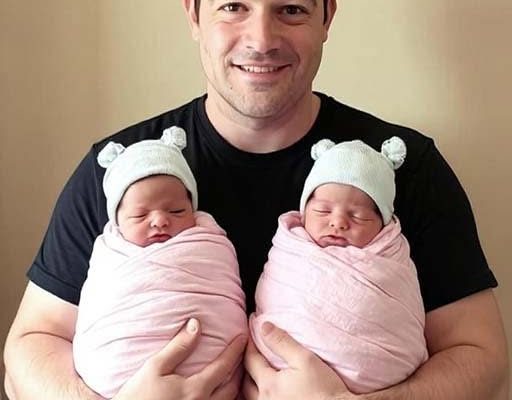The day I went to pick up my wife and our newborn twins from the hospital was supposed to be one of the happiest moments of my life. I had everything ready—balloons in the car, dinner waiting at home, the nursery glowing with soft light and freshly framed photos on the walls.
I was giddy, nervous, and proud. After months of pregnancy filled with sleepless nights, morning sickness, and constant stress—mostly worsened by my overly critical mother, Patricia—Emma deserved nothing but peace and celebration. I wanted to give her the perfect homecoming.
But when I stepped into her hospital room, that dream shattered instantly. The bassinets were there, the girls sleeping quietly inside them. But Emma was gone. No goodbye. No explanation. Only a folded envelope resting on the side table. My hands trembled as I opened it. The note inside was short, sharp, and devastating.
“Goodbye. Take care of them. Ask your mother WHY she did this to me.”
The words blurred as I reread them. My pulse thundered in my ears. What did she mean? Why would she vanish now, of all times?
A nurse walked in holding a clipboard, ready with discharge forms. I asked her where Emma was, and she calmly explained that Emma had checked out earlier, saying I knew. I hadn’t. Emma had left without telling me. My world tilted. I left the hospital carrying our daughters and a thousand questions, the weight of that single note pressing into my chest.
When I got home, my mother was waiting on the porch, holding a casserole and beaming with pride. She reached out to meet her granddaughters, but I stopped her cold and handed her the note. Her smile vanished. She read the message and began stammering, saying she had no idea what Emma meant, that she was just “being emotional.” But I’d had enough. I confronted her—about the jabs, the judgment, the relentless way she had chipped away at Emma’s confidence over the years. All she could offer were excuses masked as concern. I didn’t believe her.
Later that night, while the twins—Lily and Ava—slept soundly, I searched through Emma’s belongings. I needed clarity. And then I found it. A second note, tucked beneath her jewelry box, but this one was unmistakably written by my mother.
“Emma, you will never be good enough for my son. This pregnancy doesn’t fool me—you trapped him. If you really love him and those babies, you’ll leave before you ruin their lives.”
My knees buckled. I felt like I’d been punched. That was it. That was what had broken her. Not just years of insults and cold shoulders—but this final, cruel push.
I stormed into the guest room, confronted Patricia, and showed her the letter. She denied nothing. “I was trying to protect you,” she said. But I saw it for what it was—control masked as care, sabotage disguised as love. I told her to leave. That night, she packed her things and was gone.
What followed were the hardest months of my life. I was a single dad to twin newborns, barely sleeping, barely functioning, but still holding onto the memory of Emma. I reached out to everyone she knew—friends, coworkers, even old classmates. Most had no idea where she’d gone. But one person did.
Her college friend Natalie finally shared what I feared. Emma had felt overwhelmed, unheard, judged. The pressure from my mother had pushed her to the edge, and she left thinking she was doing what was best for the girls. She thought they’d be better off without her. She thought I would be better off too.
Then one day, my phone buzzed. A message from an unknown number. I opened it to find a photo of Emma in the hospital, holding Lily and Ava. She looked tired but serene. Beneath the photo were just a few words.
“I wish I was the mother they deserve. I hope you forgive me.”
I called the number. It didn’t go through. I texted. No reply. But I held onto that message like a lifeline. She was alive. She still cared. That was enough to keep me going.
A year passed. The twins turned one. I tried to give them a day full of joy, but part of me was still broken—until the knock came at the door.
I opened it and froze. Emma stood there, holding a gift bag, eyes full of tears. She barely whispered, “I’m sorry,” before I pulled her into my arms. She sobbed into my shoulder, and I felt something shift back into place.
Over time, she told me everything. About the postpartum depression. The isolation. How Patricia’s words had haunted her every day. She hadn’t wanted to leave—but she didn’t know how to stay.
I told her what she should have always known: she didn’t have to do it alone. We could carry the weight together.
It wasn’t easy. Healing never is. But love found its way through the wreckage. And this time, we held on—with both hands, and with hearts wide open.



